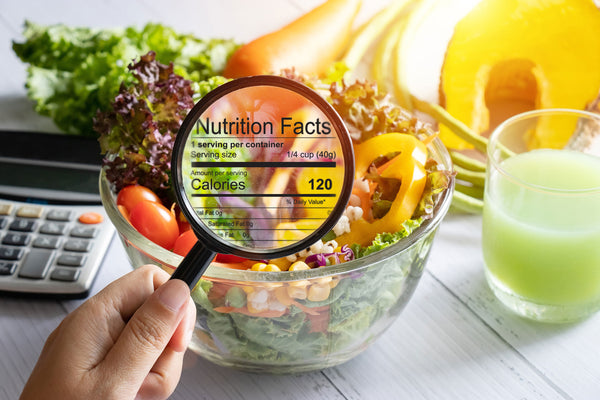“My Diet Isn’t Working"
Do you ever find yourself saying this? Or have you heard someone else say it? “I’m doing all the right things… I don’t understand why I’m not dropping weight”.
Trust me, I know how frustrating it is when diet and exercise aren’t working. When you're busting your butt in the gym but aren’t seeing the results you’d like. Maybe you’ve been dieting for a while and your progress has come to a stand-still. Or maybe you just started your fitness journey a few weeks ago and aren’t seeing the results you were hoping to see. Either way, there are a few fairly simple reasons for your frustrations, so my goal is to shed some light and hopefully help you pinpoint the reasons why diets fail.
Reason #1: You’re not sticking to your diet long enough
You “diet” for a few weeks, maybe even see some results at first, then stop seeing progress, so you stop and/or try a different diet. You end up hopping on and off several different diets, all to stay nearly the same weight. I hear this so often! “I’ve tried keto, paleo, whole30, weight watchers, why am I not losing weight?!” I hate to break it to you, but sometimes the diet isn’t the problem… rather, your ability to adhere to it. Any diet “works” if you’re in a caloric deficit. That’s just science.
One salad won’t make you lose fat overnight just like one hot fudge sundae won’t make you gain fat overnight. Fat loss requires an abundance of patience as it can be a slow and painful process. I know that “waiting” it such a foreign word now with technology giving us such instant results, but unfortunately that’s just not how fat loss works. If you’re ready to take your health seriously, then you’re going to need to commit to your diet for longer than a few weeks. And if you can’t see yourself “lasting” on a particular type of diet; ex: keto, paleo, etc, then you probably shouldn’t start it at all. Consistency is key!
The Fix:
Find a diet you like. Yes, I did just use “diet” and “like” in the same sentence. Your diet doesn’t need to be miserable! If you’ve had to cut out all your favorite foods, cut food groups, or are forcing down foods you don’t like… YOU’RE DOING IT WRONG. So what’s the best diet? The one you can STICK to! That’s why I’m a huge advocate of “flexible dieting”; the notion that you can eat what you’d like (within reason) provided that it fits within your daily allotment of calories and macronutrients (carbs, fats, and proteins). This is the dieting concept I myself follow AND it’s the concept I teach my online coaching clients to use. Why? Because it doesn’t restrict any particular foods (unless there is an allergy or sensitivity present of course), its maintainable, and it doesn’t “feel” like dieting.
Reason #2: You’re not eating ENOUGH!

Hold on, isn’t that the point of dieting? Eat less and you’ll lose more? Yes…but also no….sometimes. I know when you’re not losing weight it’s extremely easy to say “okay, guess I’m still eating too much. Time to cut more calories!” While in some cases this is true, constantly lowering your calories week after week will not always illicit the results you are looking for. You see, your body always wants to maintain homeostasis. It will always *eventually* adjust to find what I like to call a “new normal”. This means each time you drop your calories lower, your body must learn to live off of that caloric intake. It essentially says “Hey, if you’re only feeding me 1,000 calories, then I’ll learn how to function efficiently on 1,000 calories”. The body's job is to be effective, efficient, and keep you safe. It’s not “fighting” you. It’s trying to save you by adapting. It doesn’t want you to drop all this weight and starve yourself, so it adapts. This is why it’s always better to start with higher calories when you’re dieting. The more calories you start with, the more “wiggle room” you have when your fat loss “stalls”. This is also why it’s often wise to make smaller cuts to your calories if you suspect you need to lower them, rather than making drastic reductions.
Consider Stress Response
Another important thing to consider with extreme caloric deficits is the stress response that often takes place beneath the surface. When the body perceives stress, be it mental OR physical, a hormone called cortisol gets released. Acute releases of cortisol can be a good thing, but chronically high cortisol makes dieting extremely difficult. Oftentimes, the more our diet “stalls”, the harder we start to push it in the gym and amp up those cardio sessions. This is often a recipe for disaster when it comes to cortisol. You see, in the long-term, excessive cortisol can be a detriment to our overall health, muscle building abilities, and fat burning abilities. Not to mention when cortisol goes up, our bodies typically hold onto more water. This causes us to feel “softer” and “less lean” than we actually are. This water retention can mask the fat loss that IS occurring, making it seem like we aren’t progressing, but we still very well maybe!
Moral of the story: Your calories don’t always need to be as low as you think. Start your “diet” with the least restrictive approach. Calories still semi-high and very little cardio. Then, when your metabolism does adapt to your current regimen (which it will), you still have some wiggle room for caloric reduction and increasing cardio. Remember, small changes add up to big results!
Reason #3: You’ve been in a deficit for too long.

When I reference a “deficit”, I'm referring to a caloric deficit. Caloric maintenance would refer to eating a specific amount of calories to maintain your current weight. A caloric deficit refers to eating fewer calories than your body needs to maintain its weight. Or, we can be in a caloric surplus; eating more calories than your body needs to maintain its weight. Note: a deficit can be created from consuming fewer calories, doing more activity (calories burned), or a combination of both. Like I mentioned in reason #2, your body has a natural “set point” it’s most comfortable at. I recently saw a great analogy on this topic: “Think of it as the thermostat in your house. When you don't get all the calories you need for long periods of time, your body regulates itself by turning down your metabolism, just as a thermostat would if your house got too hot. It's a regulated system designed to keep your metabolism in line with your daily caloric intake.” That being said, don’t forget to give your body a break. If you can’t remember the last time you weren’t trying to lose weight, there’s a good chance it’s time to give your body AND mind a rest. After a long period of caloric restriction and weight loss, metabolic adaptations begin to take place. Your organs use less energy, your heart rate slows, your SNS activity decreases, thyroid hormones, testosterone, leptin, and ghrelin are negatively affected, your NEAT decreases (non-exercise activity thermogenesis), and overall your body and muscles become more efficient, requiring less fuel and calories. Ever wonder why it’s so hard to lose those “last few pounds”? Simply put, a caloric deficit gets harder and harder to achieve after the fat loss as your maintenance calories have decreased due to metabolic and hormonal adaptations. You’re not broken. It’s normal!
The Fix:
If you suspect what I listed above is happening to you, it may be time to explore the notion of “reverse dieting”. Essentially this method allows you to slowly increase your calories back up to maintenance and beyond to reverse the negative effects of dieting and increase your metabolic capacity. Both my clients and I have seen how incredible reverse dieting can be for restoring your hormones and overall health after an extended period of dieting.
Reason #4: You’ve cut out too many of your favorite things.
Sometimes, the more strict our diet is, the harder it is to resist our favorite foods. This is often why “strict” or “structured” meal plans don’t work. Or don’t work for an extended period of time at least. If your diet requires you to only eat “good foods” and cut out all “bad foods”, there’s a good chance you’ve developed a pretty unhealthy relationship with food. One that might consist of a vicious binge and restrict cycle. While you may have never considered yourself a “binge eater”, it’s more common than you think. You know, strict all week, on point with your diet for 5 consecutive days then you get to the weekend and “blow it”. Drinks, nachos, wings, burgers, whatever. Then Monday hits and your back on your diet. I see it all the time, or some level of it at least. When you are constantly feeling restricted from certain foods, the desire to have them becomes stronger and stronger. So, you have one potato chip or one bite of a cookie and before you know it, you’ve blacked out and have eaten 2 days worth of calories in one sitting. And it’s not over!!! Here comes the guilt. The anger. The disappointment in yourself. And so, the cycle continues. You’re strict. You binge. You feel guilty. Repeat.
The Fix:
Instead, try a more maintainable and realistic style of dieting; again, enter “flexible dieting”. No food restrictions, no bad foods. Simply eat within your caloric means and try to follow the 80/20 or 90/10 rule. The larger percentage being wholesome, nutrient-dense foods, high-quality foods, and the smaller percentage being room for the “fun” stuff and small indulgences.
Conclusion
As you can see, there are several reasons as to why someone’s diet may be failing them. Ultimately, it’s up to you to figure out what works well for you and what doesn’t. Don’t be afraid to be your own investigator and endure some trial and error. Dieting is not one size fits all!
(Guest Post by Joelle Cavagnaro)
The information being presented in this blog is intended to be used as educational or resource information only. It is not intended to be a substitute for medical advice from your healthcare provider. This content should not be used for the diagnosis or treatment of any medical condition. If you have any questions or concerns about your health, please contact your healthcare provider. You should call 911 for all medical emergencies. Revive MD is not liable for any advice or information provided on this blog, which advice or information is provided on an “as-is” basis, and assumes no liability for diagnosis, treatment, decisions, or actions made in reliance upon any advice or information contained on this blog. No warranties, express or implied, are made on the information that is provided.





 Liver & Detox Support
Liver & Detox Support
 Gut & Digestive Health
Gut & Digestive Health
 Hormones, Stress & Metabolism
Hormones, Stress & Metabolism
 Sleep & Relaxation
Sleep & Relaxation
 Heart, Brain & Immune Health
Heart, Brain & Immune Health


